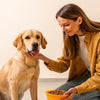What to Feed My Senior Dog to Gain Weight: A Comprehensive Guide
- Houndsy
Table of Contents
- Introduction
- Understanding Weight Loss in Senior Dogs
- Nutritional Guidelines for Senior Dogs
- Practical Feeding Strategies for Underweight Senior Dogs
- The Importance of Regular Veterinary Check-Ups
- FAQs
Introduction
As our beloved canine companions age, their health and nutritional needs undergo significant changes. Did you know that nearly 40% of senior dogs experience weight loss at some point in their lives? This situation can be concerning for pet owners as maintaining a healthy weight is essential for their overall well-being. If you've found yourself wondering what to feed my senior dog to gain weight, you're not alone. Many dog owners face this challenge, and understanding the right dietary adjustments can make a world of difference.
In this blog post, we will explore the various factors contributing to weight loss in senior dogs, effective dietary strategies to help them regain weight, and additional lifestyle changes that support their health. By the end of this article, you’ll have a clearer picture of how to ensure your furry friend maintains a healthy weight, ultimately enhancing their quality of life.
We will cover the following key topics:
- Common causes of weight loss in senior dogs
- Signs that indicate your dog needs to gain weight
- Nutritional guidelines and food recommendations
- Practical feeding strategies for underweight senior dogs
- The importance of regular veterinary check-ups
As we delve into these topics, we invite you to reflect on your own pet's feeding routine and consider whether it supports their unique needs. Let’s embark on this journey to help our senior dogs thrive!
Understanding Weight Loss in Senior Dogs
Common Causes of Weight Loss
Several factors can contribute to weight loss in senior dogs, and recognizing these is crucial for addressing the issue effectively. Here are some common causes:
- Underlying Health Conditions: Various medical issues, such as diabetes, kidney disease, liver disease, and cancer, can lead to significant weight loss. If your dog is losing weight despite having a good appetite, it’s essential to consult your veterinarian for a thorough examination.
- Dental Problems: Painful dental conditions can make it difficult for dogs to eat comfortably. If your senior dog has dental issues, they may avoid eating, leading to weight loss.
- Metabolic Changes: Aging affects a dog's metabolism, often resulting in changes to their appetite and energy levels. Conditions like hyperthyroidism can increase metabolism, causing weight loss even when the dog is eating normally.
- Sarcopenia: This is the age-related loss of muscle mass, which can occur as dogs get older. Reduced physical activity often exacerbates this issue, making it critical to implement gentle exercise routines.
- Nutritional Deficiencies: As dogs age, they may require different nutritional profiles. A diet that was once appropriate may no longer meet their needs, leading to weight loss.
- Psychological Factors: Stress, anxiety, or changes in the household can impact a dog’s appetite. Recognizing and addressing these emotional factors is vital for their overall health.
Signs Your Senior Dog Needs to Gain Weight
It’s essential to monitor your senior dog's body condition and behavior. Here are some signs that may indicate your dog needs to gain weight:
- Prominent Ribs and Spine: If you can easily see your dog's ribs or spine, this is a clear sign they may be underweight.
- Lethargy: A lack of energy or enthusiasm for daily activities can indicate insufficient nutrition.
- Loss of Muscle Tone: If you notice that your dog has lost muscle mass, it may be time to reassess their diet.
- Decreased Appetite: Dogs that show a lack of interest in food or eat less than usual may need dietary adjustments.
- Changes in Coat Condition: A dull coat can signal nutritional deficiencies that might be contributing to weight loss.
If you identify any of these signs in your senior dog, it’s crucial to take action promptly.
Nutritional Guidelines for Senior Dogs
High-Quality Protein Sources
When considering what to feed your senior dog to gain weight, high-quality protein is essential for maintaining muscle mass. Look for dog foods that contain easily digestible proteins such as:
- Chicken: A lean protein that is palatable and packed with essential amino acids.
- Fish: Rich in omega-3 fatty acids, fish supports both skin and joint health.
- Eggs: A nutrient-dense food that provides high-quality protein and healthy fats.
Healthy Fats
Incorporating healthy fats into your dog's diet can boost calorie intake without increasing volume. Consider the following fat sources:
- Fish Oil: Provides omega-3 fatty acids that promote joint health and improve coat condition.
- Coconut Oil: Offers a quick source of energy and can improve digestion.
- Nut Butters: Natural peanut butter or almond butter can be great treats that also provide healthy fats (ensure they are unsweetened and free from xylitol).
Specialized Senior Dog Foods
Look for dog foods specifically formulated for senior dogs. These often contain added nutrients designed to support aging bodies, such as:
- Antioxidants: To combat oxidative stress and promote overall health.
- Joint Support: Ingredients like glucosamine and chondroitin can help maintain joint health and mobility.
- Higher Caloric Density: Foods with higher fat content can help underweight dogs gain weight more effectively.
Frequent, Smaller Meals
Feeding smaller, more frequent meals can encourage better digestion and nutrient absorption, making it easier for your dog to maintain or gain weight. Aim for three to four meals a day instead of the traditional two.
Practical Feeding Strategies for Underweight Senior Dogs
Monitor Portion Sizes
When adjusting your senior dog's diet, it’s essential to monitor their portion sizes carefully. Begin by increasing their daily intake gradually, ensuring you don’t overfeed them to avoid digestive upset.
Introduce New Foods Gradually
If you’re considering changing your dog’s food, do so gradually. This helps prevent gastrointestinal issues and allows your dog to adjust to the new flavors and textures. Start by mixing a small amount of the new food with their current diet and gradually increase the proportion over several days.
Consider Adding Toppers
To make meals more appealing, consider adding healthy toppers or mix-ins. Some popular options include:
- Pumpkin: A great source of fiber that can aid digestion.
- Sweet Potatoes: Nutrient-rich and can be served mashed or cubed.
- Low-Sodium Broth: Adding a splash can make dry kibble more enticing.
Hydration Matters
Ensure that your senior dog stays hydrated. Sometimes, weight loss can be attributed to dehydration, which can affect their appetite. Always provide fresh water and consider adding moisture to their food with wet food or broth.
The Importance of Regular Veterinary Check-Ups
Regular veterinary visits are crucial for monitoring your senior dog's health, especially if they are experiencing weight loss. Your veterinarian can:
- Identify Underlying Health Issues: Early detection of medical conditions can lead to more effective treatment.
- Provide Dietary Recommendations: Based on your dog's individual needs, your veterinarian can suggest specific dietary adjustments or recommend high-quality dog food brands.
- Monitor Weight Changes: Regular weigh-ins can help track your dog’s progress and make necessary adjustments to their feeding routine.
Conclusion
Caring for a senior dog requires attentiveness to their dietary needs and health changes. By understanding what to feed your senior dog to gain weight, you can help them regain strength and vitality in their golden years. Remember that high-quality protein, healthy fats, and specialized senior dog foods are key components of a nutritious diet.
As you embark on this journey to support your furry friend’s health, don’t hesitate to reach out to your veterinarian for guidance and support. Together, we can ensure our senior dogs enjoy a happy, healthy, and fulfilling life.
FAQs
How do I know if my senior dog is underweight?
You can assess your dog’s weight by observing their body condition. If their ribs and spine are easily visible, or if they have lost muscle mass, they may be underweight. Consult your veterinarian for a professional evaluation.
What should I do if my dog is losing weight but eating normally?
If your dog is eating well but still losing weight, it’s essential to consult your veterinarian. They can help identify any underlying health issues that may be contributing to the weight loss.
Can I feed my senior dog human food?
Yes, you can supplement your senior dog’s diet with healthy human foods like cooked chicken, sweet potatoes, and plain pumpkin. Just ensure that any additions are safe and suitable for dogs.
How often should I feed my senior dog?
Feeding your senior dog smaller meals more frequently throughout the day can help them maintain or gain weight. Aim for three to four meals rather than the traditional two.
What role does exercise play in helping my senior dog gain weight?
Gentle exercise can help maintain muscle mass and stimulate appetite. Always consult your veterinarian for appropriate exercise recommendations based on your dog’s health status.
If you're looking to enhance your dog's feeding experience, consider exploring the Houndsy Kibble Dispenser. With its innovative design and functionality, it makes mealtime simpler and more enjoyable for both you and your furry companion.












